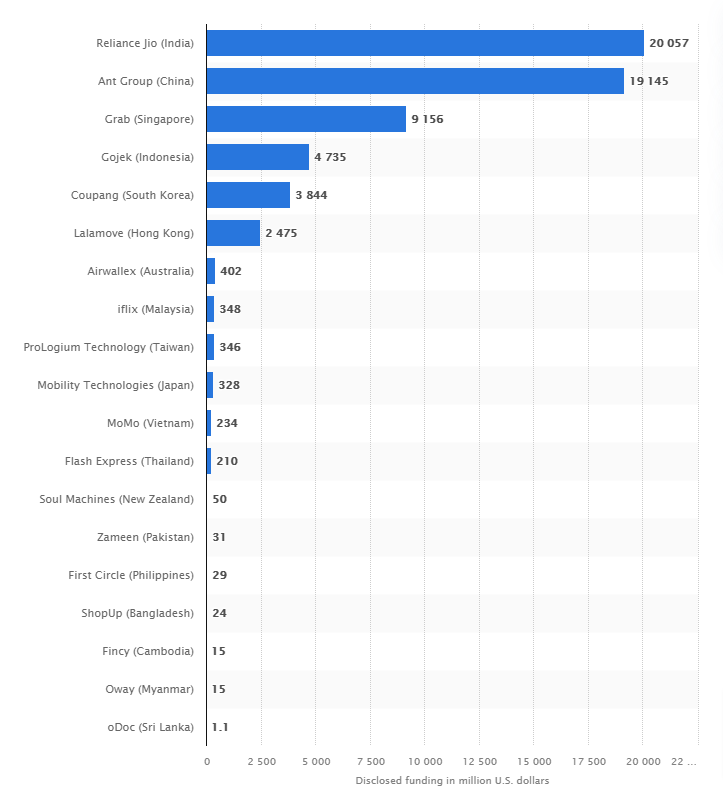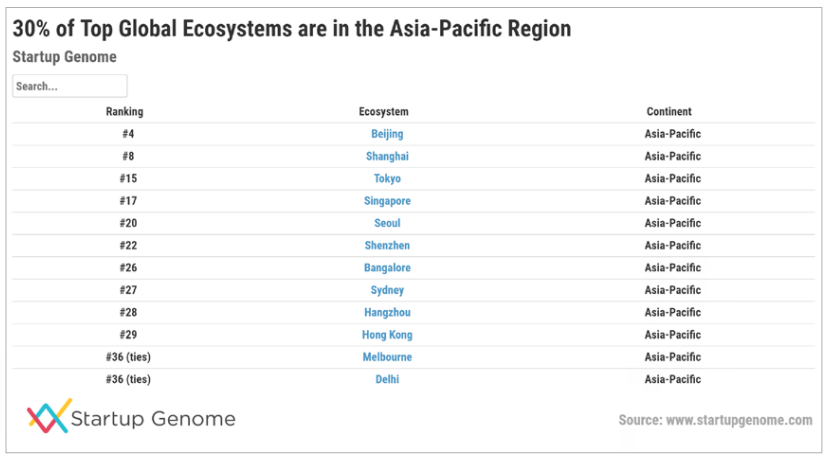5 Things You Should Consider Before Joining a Startup

Joining a startup may be a daunting experience with its share of perks and perils, especially if this is your first experience with a startup. So, you should always clarify any concerns you have during your interview.
Many people make the mistake of not asking relevant questions during their interviews and are more concerned about impressing the interviewers. Asking these questions could help you make an informed decision by evaluating whether a startup is the right environment for your needs. Now, you may be thinking, “How do I evaluate a startup?”
We’ve got you covered. In this article, we list the major factors you should consider when evaluating a startup’s performance. We have also added questions that you can use during your interview to get the answers that you are looking for.
Current Scenario of Startup Growth in Asian Countries
Startups address non-existing markets yet to be explored by other companies and provide innovative solutions. Investors are often keen to invest in startups as they have high growth potential and innovative business ideas.
The startup scene is garnering much attention worldwide. In fact, Asian countries are not falling behind. Take the example of Ant Financial. According to Statista, this extremely successful Chinese startup has raised over $19.8 billion of funding since its establishment in 2014.
Here’s an overview of some of the Asian tech startups and their acquired funding in million $ till 2020:

The Asia-Pacific region has observed massive growth in the overall tech startup scene. As of 2020, 30% of the top global ecosystems are in the Asia-Pacific region itself. Beijing currently holds the 4th position out of the 30% global eco-systems in this region. Other Asian cities that have made this list includes Shanghai, Singapore, Tokyo, Bangalore, Seoul, and more.

According to Startup Genome’s 2020 report, seven major success factors are attributed to the growth of tech startups in the Asia-Pacific region. These include:
- Performance
- Talent
- Funding
- Market Research
- Talent
- Connectedness
- Infrastructure
- Knowledge
According to InformationAge, approximately 1 billion new consumers will be added to Asian markets by 2040. This expanding market is a positive development for startups.
The rapid growth of these countries can be accredited to the growing youth population in Asian countries. Compared to European and American markets where aged consumers are targeted, Asian countries have a younger customer base. The characteristic of young consumers being tech-savvy also contributes to the proliferation of tech startups in Southeast Asia.
To ensure startup success, a country must have enough room for a startup to scale. As many industries in European and American countries have already grown saturated, these developed economies don’t have much to offer in terms of startup growth.
On the other hand, many Asian countries are still in the emerging phase. This means that there is plenty of scope for new products, innovations, and markets. Hence, even startups with contemporary products have sufficient growth prospects in these countries.
Factor #1: The Product and the Industry
Before joining a startup, you need to understand the product that they are offering and the industry they operate in. There is no point in joining a startup if you feel that their product doesn’t have sufficient market potential or if the industry is already too saturated.
Every product and service being launched by an enterprise has to solve a market problem. Take the example of the emergence of cloud computing. Many enterprises worldwide struggled to achieve long-term flexibility and scalability due issues like data loss, accessibility problems and limited data storage. With cloud computing, these challenges were resolved. Cloud computing is a flexible solution to unlimited file sharing, easy data recovery, and high scalability.
Take note that not all problems are considered profitable problems a company should address. It is important that the identified problem is a pertinent pain point for the targeted audience. Additionally, the startup should also validate the depth of the problem.
Gain an understanding of the startup’s key competitors by identifying the products they offer and their market presence. If the startup’s competitors are industry leaders with a large customer base, you should identify how the unique selling points of this startup differentiates from them.
You should also be aware of the industry’s growth potential. The startup may have a good unique selling point, but if the industry is maximized or does not possess any growth potential to begin with, the startup will be left with little to no opportunities for growth.
The DVD rental industry is a prime example of a failed industry. Most of us have memberships to OTT platforms and stream movies and TV shows online. Nowadays, people rarely buy or rent DVDs. If the startup you’re applying for wants to join industries like this, you should focus on finding out more on whether it still has areas to grow and succeed.
Questions that you can ask during an interview to find out more:
- Who are your 3 key competitors in the market?
- How can you distinguish your products from similar solutions available in the market?
- Which opportunity gaps are you targeting in the market for this particular industry?
Factor #2: The Founders
The founders act as the foundation of every startup. While evaluating the future prospects of a startup company, focus on finding out more about the founders and their work experience.
If you discover that the founders have remarkable experience of working in the same industry as the startup’s, it could indicate that they’re more likely to lead the startup in the right direction.
You should also research if they have previous experience in managing teams by finding out what kind of roles they previously held. If you discover that they used to hold leadership positions and were actively managing small to large teams, this is a good sign.
This research could also give you insights into their leadership style and their potential in building strong teams. You should also evaluate whether this would suit your working style.
When you join a startup company, remember that the vision of the organization will largely be your vision. That means you should have a clear understanding of the founders’ vision for the future and where they see the startup in the next 5 to 10 years.
Questions that you can ask during the interview to find out more:
- Where do you foresee the company in 5 years?
- What are your personal goals for the startup?
- What inspired you to start the company?
Factor #3: The Company and The Team
Everyone wants to be part of a startup company that has a good reputation in the market that can value add to their careers.
Start with researching the startup’s brand image. Take note that it may be the case that the startup is still too young and has not built a brand identity for itself in the market.
Here are some steps you can follow to get an idea about the startup’s brand image:
- Go to their official website and see what testimonials they have. Find out what their existing clients are saying about them.
- Search in different techie communities to find out what reviews people are having about the startup’s products, services, operations, etc.
Another factor that you must consider is the company culture. Once you join the startup, you’ll have to live, eat and breathe its company culture. So, it is always a good idea to gain as much information as possible about the company culture and make sure it’s the right fit for you.
You should take the time to also understand the team culture. You would most probably be working in a tight-knit team as most startups work in small to medium teams. Often, each team is led by a leader who influences the team dynamics. Get acquainted to your future team leader to better understand and facilitate work expectations.
Questions that you can ask during the interview to find out more
- How would you describe the working culture here, especially with the team that I will be part of?
- What kind of organizational structure do you follow? What will it look like in the next 6 to 12 months for me?
- How are decisions made in the organization when there are disagreements among the employees?
Factor #4: Financial Factors
In the beginning, a business's main focus is to achieve breakeven. You need to ensure that the startup founders are financially capable of running the business until it can cross this point.
Understand how the company plans to achieve this by enquiring about their funding plans. There are various funding options available with some being risk-free and others much more risky. This could range from issuing equity shares to raising funds with venture capitalists.
You need to know which path the startup founders are planning to take. If you find that their financial plans are plausible, this indicates a good signal for you to join the startup.
Finally, you should also gain an in-depth understanding of the startup’s revenue stream. Selling their main product may not be the only revenue stream for this startup as it could generate revenue through secondary channels like subscription fees, leasing, brokerage, and more.
This information will help you understand the startup’s financial position and prospects in the market and you can base your final decision accordingly.
Questions that you can ask during the interview to find out more:
- What is your current financial situation, and what are your funding plans in the upcoming future?
- Is the startup solvent?
- How does your financial projections look in the next 3 years?
Factor #5: Learning and Career Growth
Learning and career growth opportunities are important aspects to consider, especially if you are building your career.
We believe that every employee should evaluate the potential career growth opportunities associated with their position. At the end of the day, what really matters is how much you learn from your job responsibilities.
Start your evaluation by identifying the stage the startup is currently at. If you join a startup in its early days, you may be exposed to a concept called “startup chaos”. Things may be a little disorganized and chaotic. But this is not always a bad thing.
Startup chaos can help you grow in more ways than you can imagine. Every experience you gain at this phase will be practical, as there is no time for hypothetical learning. If you resonate with this chaotic environment, the skills you acquire will stay with you for a long time.
Being clear on the personal growth potential associated with your role is very important. Make sure you have a clear understanding on your job responsibilities, the skills you will acquire in the process, and who your primary stakeholders are.
Questions that you can ask during the interview to find out more
- What is your startup’s approach to team building and career growth?
- What are the career growth opportunities for this role?
- What should be an employee’s nature to succeed in this company?
We have one final recommendation. Once you’ve evaluated all these factors, ask yourself this important question: Do I really believe in this startup’s idea?. This answer can only come from you.
Find this answer based on all the evaluations you have made till now. What does your intuition tell you? If the startup’s idea still doesn’t make any sense to you, it’s a better decision to pass up this opportunity. That’s the best option for you and the startup.
We hope the factors and questions we listed here were helpful. Let us know if you have any questions. We’ll be happy to answer.
Backend Technology Interview Questions
C Programming Language Interview Questions | PHP Interview Questions | .NET Core Interview Questions | NumPy Interview Questions | API Interview Questions | FastAPI Python Web Framework | Java Exception Handling Interview Questions | OOPs Interview Questions and Answers | Java Collections Interview Questions | System Design Interview Questions | Data Structure Concepts | Node.js Interview Questions | Django Interview Questions | React Interview Questions | Microservices Interview Questions | Key Backend Development Skills | Data Science Interview Questions | Python Interview Questions | Java Spring Framework Interview Questions | Spring Boot Interview Questions.
Frontend Technology Interview Questions
HTML Interview Questions | Angular Interview Questions | JavaScript Interview Questions | CSS Interview Questions.
Database Interview Questions
SQL Interview Questions | PostgreSQL Interview Questions | MongoDB Interview Questions | MySQL Interview Questions | DBMS Interview Questions.
Cloud Interview Questions
AWS Lambda Interview Questions | Azure Interview Questions | Cloud Computing Interview Questions | AWS Interview Questions.
Quality Assurance Interview Questions
Moving from Manual Testing to Automated Testing | Selenium Interview Questions | Automation Testing Interview Questions.
DevOps and Cyber Security Interview Questions
DevOps Interview Questions | How to Prevent Cyber Security Attacks | Guide to Ethical Hacking | Network Security Interview Questions.
Design Product Interview Questions
Product Manager Interview Questions | UX Designer Interview Questions.
Interview Preparation Tips
Strength and Weakness Interview Questions | I Accepted a Job Offer But Got Another Interview | Preparation Tips For the Virtual Technical Interview | 7 Tips to Improve Your GitHub Profile to Land a Job | Software Engineer Career Opportunities in Singapore | What can you expect during a whiteboard interview | How To Write A Resignation Letter | Recommendation Letter Templates and Tips.
Quick Links
Practice Skills | Best Tech Recruitment Agency in Singapore, India | Graduate Hiring | HackerTrail Litmus | Scout - Sourcing Top Tech Talent in ONE Minute | About HackerTrail | Careers | Job Openings.






Joining a startup is a commitment, and could be very rewarding if you pick the right one. Hit me up for more info – I may know a thing or two about this. 🙂
Interesting article.